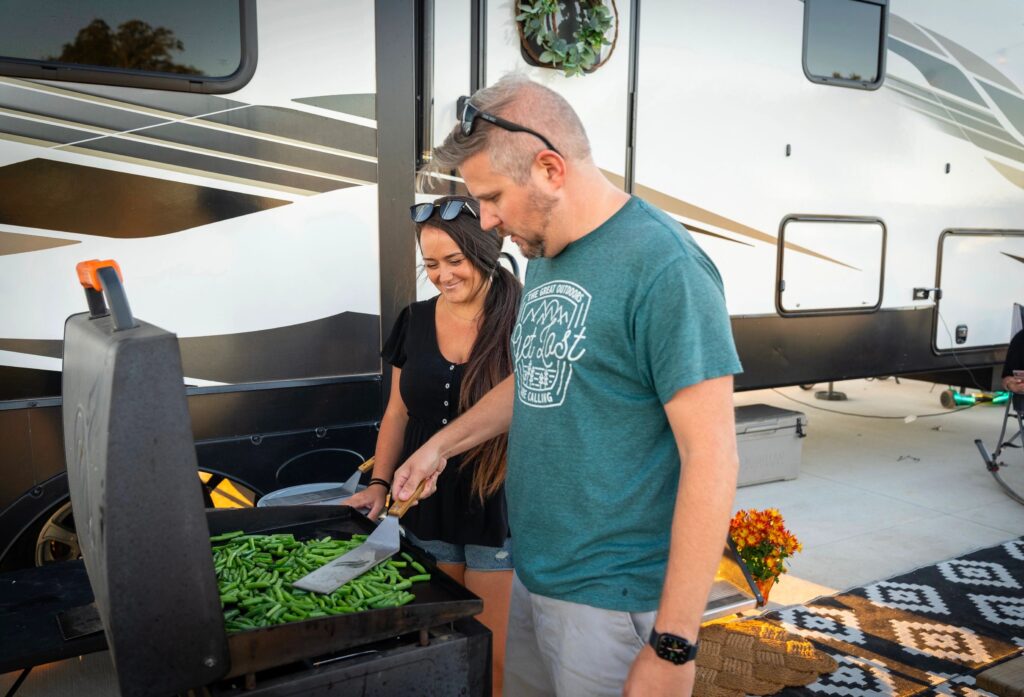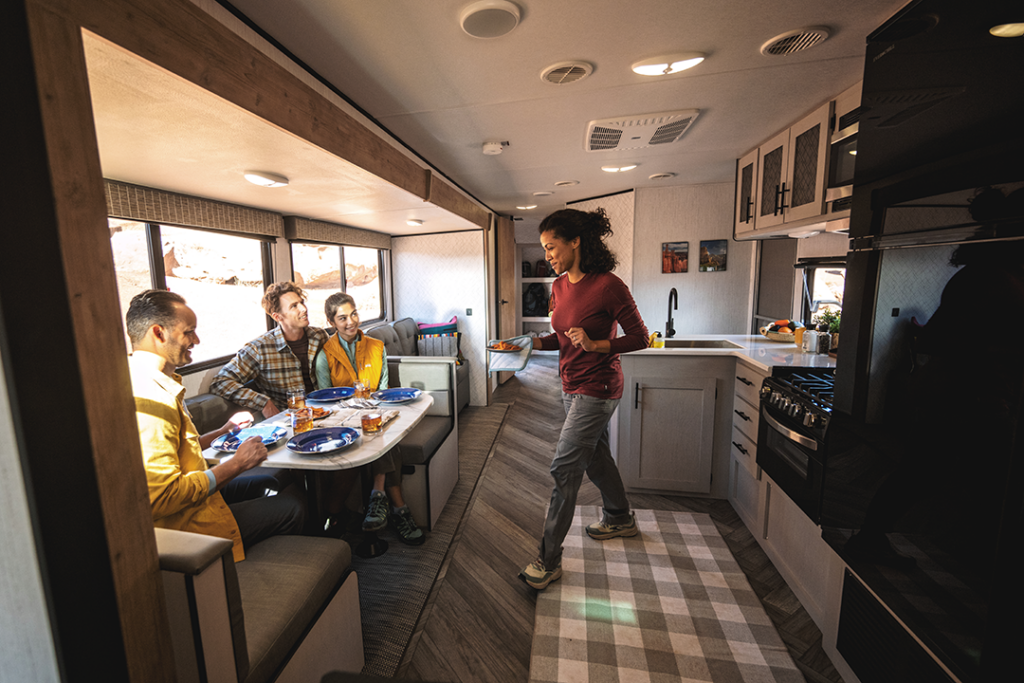Essential Cooking Gear Every RVer Needs
Road Trips are a great way to get away from the stresses of life and have a relaxing holiday on the road or at a campsite. Traveling in an RV is especially a fun way to see the sights of the country and a good way to travel with the family. However, one big factor in making your trip a success is making sure that your meals are planned in advance and prepared adequately. In this article, we will provide you with the essential cooking tools to help create memories and meals that the family will remember with nostalgia.
Knowing Where You Are Going
Choosing the right RV to hire is the easiest part of your trip - all you need to do is make sure that everyone attending will fit comfortably.
The important part is picking out your route appropriately. If you are traveling cross country or going to a selected destination, you need to plot out several pitstops to make sure that you can make the most of your meal options when you’re on the road. This will save you a lot of time and space rather than risking food spoiling on the RV.
Travel and Cooking on the Road
The best way to get ahead of cooking on a road trip is to plan ahead:
Make meal plans for all meals of the day and snacks. Remember to have a backup plan when any of the meal ideas fall through.
- Make a checklist of everything you need, including meal ingredients, homemade rubs, and even equipment.
- Make your food last longer by storing it properly. Keep things that need to be cool in the refrigerator and freezer instead of cooler boxes. This will prevent it from spoiling too quickly. RVs come equipped with a fridge.
- A road trip and holidays are meant for relaxing, don’t make things too hard on yourself, and opt for recipes that are easy to whip up.
- Have all the necessary cooking equipment and an outdoor cooker and space to prepare food.
- Avoid food that can cause lingering smells, especially if you are cooking them inside the RV.
Cooking Challenges Faced on the Road
The thing about plans is that not everything will go according to them, but that's why you need to have in place contingency plans. While you’re on the road, these are some of the hiccups that can occur and how to overcome them.
- It can be difficult to find food that meets all your nutritional goals while on the road, this is why you can pack vitamin supplements and healthy snacks, to offset any holes in your diet.
- Perishable items can spoil pretty quickly, opt for the canned variety instead. It will last longer and can be stored on shelves rather than in the fridge - unless specified.
- Food safety is one of the things that fall to the wayside when on holiday and camping. Try your best to adhere to food safety practices, wash fresh food, and clean your workspaces.
- The last thing anyone wants when they are on a trip is coming down with a stomach bug. You can combat this directly by being aware of food-related illnesses, their symptoms, and how to treat them and stop them from spreading.
- Consider the weather, if you have a fridge, make sure it can hold what you need. You need to be concerned about food spoiling if the weather is extreme, and if it rains you can’t cook outdoors. Make provisions for this by obtaining a covering for the side of your RV if it doesn’t come with one.
- Pack medication that will help offset any illnesses or stomach bugs like nausea or diarrhea.
- Note all the doctors and drug stores that are en route to the destination, in case you need to seek emergency aid.
Ways to Make Cooking Easier
- Consider where you are going and the pitstops that can be made. Earmark areas where you can pick up fresh produce and non-perishable items in case you get stuck.
- Try to make good choices with what you eat, try to get vegetables in at each meal if possible
- Get the whole family involved when you’re cooking. Delegate tasks, and have someone help with prep, while others help with the cooking or cleaning up after the food is made and eaten.
- Make sure that the equipment you pack is easy to clean up, and store away.
- Make some time to get acquainted with the kitchen in your RV, so that you know how everything will operate, and it will be easier to navigate when it’s time to make meals.
Cooking Equipment You May Need
The good thing about RVs is that they come with almost everything you need to travel in comfort - this includes a refrigerator and a stove, but you can pack in extra items to vary your cooking options.
- An inductor stove can be useful when you have many food things cooking at the same time.
- Pots, frying pans, and utensils are also important when it comes to cooking meals properly.
- Make sure that you have plenty of propane gas for the stove, or if you decide on grilling on a kettle cooker, wood and coal.
- Invest in proper grilling utensils to make outdoor cooking much easier to manage.
- A kettle grill is always a good option
- Get a camping grill grate to use on top of your own grill.

[IMAGE: Jeremy Bishop /Unsplash]
What Food Can You Grill on the Road?
You can basically grill anything that you can at home, it’s just a matter of packing them and taking the food items with you. There is a wide range of options, as long as you can access the food.
- Fresh veggies with a little bit of butter, salt, and pepper will be a great side dish to any main you have in mind.
- Seafood options like lobster and shrimp can be bought in advance and grilled. They come in ready-to-grill options and are done in no time at all - perfect if you want a quick and delicious meal.
- You can also have the go-to processed meat options like your hamburgers, ham, and hotdogs. But you can also choose cuts of meat like steak, chops, and chicken for some variety.
- Apart from bough seafood, you can grill fish that you catch, especially if you are camping with your RV.
- If you want to experiment a bit, why not go for a grill-top pizza with cheese, fresh veggies, and meat?
- If you want breakfast, there are ways to navigate this too - make your eggs using a muffin pan on top of the grill. Scramble them a bit, and add some cheese, onions, and ham to make it more inviting.
- Sandwiches are always better if you toast them. Add anything between two slices of bread and toast them on top of the grill. It is sure to be a warm and hearty meal.
Getting Food While on the Road
Your first point of action would be to pack whatever you may need in advance. Stock up on the non-perishable canned food before your RV Trip.
As you go along your trip, stop at farmer’s markets or supermarkets as they are great sources of fresh produce. Consult your map ahead and check on social media sites for any markets that are en route.
Markets are a great spot to get fresh produce while on the road. If you don’t want to buy meat at these markets because you prefer to fish instead, then you can grill your catch of the day for dinner instead.
If you have any leftovers from the previous day’s meal, experiment with it - make a sandwich and grill it. This way you prevent food waste from occurring.
Dining Tips for Your RV
Eating while in an RV is no issue at all, they are usually equipped with a small table that can usually support about four people. To accommodate more people, use camping chairs and tables to support others - this is especially great to eat outdoors instead of inside the RV
When it comes to the actual eating, there are two options - proper crockery or disposable ones. While the latter of the two is not very environmentally friendly, disposable is easier to place in the trash and dispose of appropriately. They are also the better option if there is not enough water to wash all the plates and utensils several times a day.
Wrapping Up
Planning an RV trip will be a cinch with food options prepared well in advance - it will leave more time for relaxing on the road trip. Cooking will also be a game changer with adequate preparation, this includes plotting out points to access fresh food on the road, packing non-perishable canned food, and grilling any food caught on the trip.








